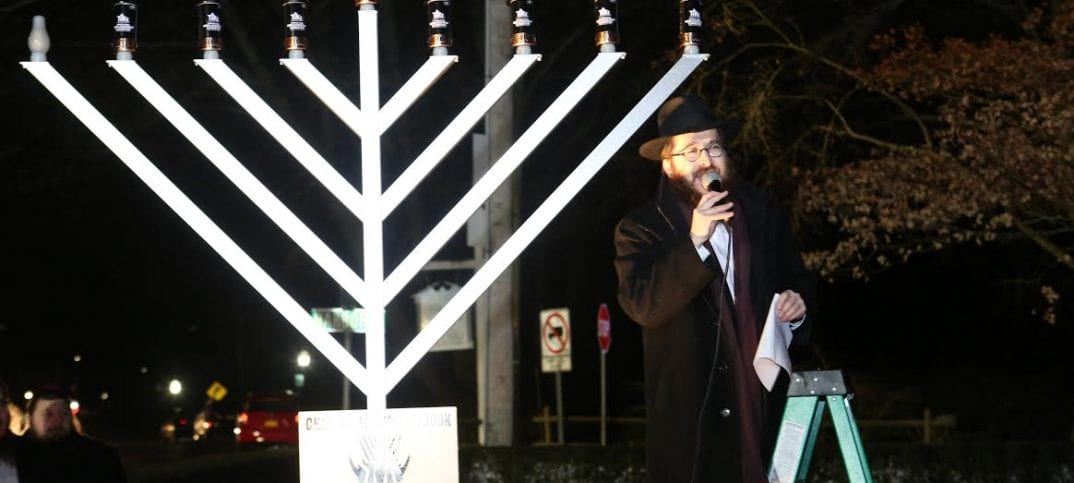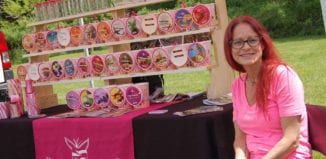By Rabbi Motti Grossbaum
As we kindle the Menorah’s lights, we pay tribute to the heroes of long ago. The courage of the Maccabees (the small band of Jewish fighters who led the revolt against the Syrian Greek religious oppressors) and their refusal to surrender in the face of terrible and overwhelming odds blazed a trail for the survival of the Jewish people and the freedom to practice our faith.
As the Chanukah story goes, the Maccabees came into the desecrated Holy Temple but they could not find any pure oil with which to light the menorah. All the oil had been defiled by the Greeks. Miraculously, they found one small jug of pure, holy, undefiled oil, enough to illuminate the temple for one night. But as we all know; a miracle took place. The tiny jug of oil lasted for 8 nights.
Friends — every single one of us is a candle. We all have a jug of oil deep inside, which is our divine soul — a spark of G-d. We may at times feel that our oil is defiled — we are uninspired. But deep down, every one of us has a small jug of untouched pure oil that, when lit, can outshine any darkness inside and out.
So the question is asked, why is it that lighting candles is such a big part of Judaism?
Candles are lit by Jewish women every Friday at sunset for Shabbat, we light candles on every festival, and Chanukah is all about candles. What is the connection between candles and spirituality?
Jewish tradition teaches that there is something about a flame that makes it more spiritual than physical. A physical substance, when spread, becomes thin. Spirituality, when spread, expands and grows. When you use something physical, it is diminished. The more money you spend, the less you have; the more gasoline you use, the emptier your tank becomes; the more food you eat, the more you need to restock your pantry (and unfortunately, the heavier you become).
But spiritual things increase with use. If I use my wisdom to teach, the student learns, and I come out wiser for it; if I share my love with another, I become more loving, not less. When you give a spiritual gift, the recipient gains, and you lose nothing. This is the spiritual property that candles share. When you use one candle to light another, the original candle remains bright. Its light is not diminished by being shared; on the contrary, the two candles together enhance each other’s brightness and increase light.
We sometimes worry that we may stretch ourselves too thin. In matters of spirit, this is never the case. The more goodness we spread, the more goodness we have. By making a new friend you become a better friend to your old friends. By having another child you open a new corridor of love in your heart that your other children benefit from too. By teaching more students, you become wiser.
My spiritual mentor and teacher, Rabbi Menachem M. Schneerson, of righteous memory, taught us that when we kindle the Chanukah flames, we should “listen closely and carefully” to what the candles are telling us. And this is what they are saying: Keep lighting your candles. There is an endless supply of light in your soul. You will never run out of goodness.
The Chanukah story happened so long ago – yet carries a timely message for us, even today.
Science has given us the greatest technologies and conveniences, yet it alone cannot free us from the moral and social challenges of our day. From gun violence and simmering racial tension, to corruption in politics, material pursuits alone do not lead to a happy and meaningful life.
Our children need a better diet than the value-system fed to them by Hollywood, the internet and mass media. They need, no, they want, inspiration, a noble cause to live for, a moral purpose that frames their pursuits and interests with meaning and direction.
Like the flames of the menorah, with a desire to make an impact and illuminate, and an ever-persistent desire to reach higher, we too can do the same, and be a beacon of light to all.
Rabbi Motti Grossbaum is director of programming and development at Village Chabad Center for Jewish Life & Learning in East Setauket.







